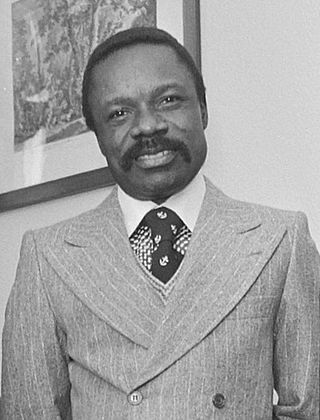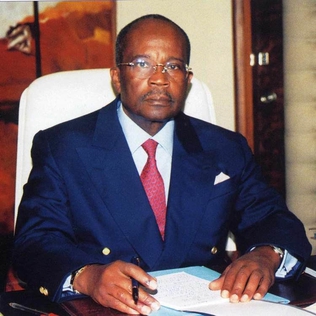| |||||
| Decades: | |||||
|---|---|---|---|---|---|
| See also: | |||||
Events in the year 1998 in Gabon .
| |||||
| Decades: | |||||
|---|---|---|---|---|---|
| See also: | |||||
Events in the year 1998 in Gabon .

Gabon, officially the Gabonese Republic, is a country on the Atlantic coast of Central Africa, on the equator, bordered by Equatorial Guinea to the northwest, Cameroon to the north, the Republic of the Congo on the east and south, and the Gulf of Guinea to the west. It has an area of 270,000 square kilometres (100,000 sq mi) and a population of 2.3 million people. There are coastal plains, mountains, and a savanna in the east. Libreville is the country's capital and largest city.
Little is known of the history of Gabon before European contact. Bantu migrants settled the area beginning in the 14th century. Portuguese explorers and traders arrived in the area in the late 15th century. The coast subsequently became a centre of the transatlantic slave trade with European slave traders arriving to the region in the 16th century. In 1839 and 1841, France established a protectorate over the coast. In 1849, captives released from a captured slave ship founded Libreville. In 1862–1887, France expanded its control including the interior of the state, and took full sovereignty. In 1910 Gabon became part of French Equatorial Africa and in 1960, Gabon became independent.

The politics of Gabon takes place in a framework of a republic whereby the president of Gabon is head of state and in effect, also the head of government, since he appoints the prime minister and his cabinet. The government is divided into three branches: the executive headed by the prime minister, the legislative that is formed by the two chambers of parliament, and the judicial branch. The judicial branch is technically independent and equal to the two other branches, although in practice, since its judges are appointed by the president, it is beholden to the same president. Since independence the party system is dominated by the conservative Gabonese Democratic Party.

The president of Gabon is the head of state of Gabon. A total of three people have served as president since the post was formed in 1960.

Omar Bongo Ondimba was a Gabonese politician who was the second president of Gabon for almost 42 years, from 1967 until his death in 2009. Bongo was promoted to key positions as a young official under Gabon's first President Léon M'ba in the 1960s, before being elected vice-president in his own right in 1966. In 1967, he succeeded M'ba to become the country's second president, upon the latter's death.

The Gabonese Democratic Party is a political party in Gabon. It was the dominant political party in Gabonese politics from 1961 until 2023, when it was deposed in a coup d'état against President Ali Bongo Ondimba. It was also the sole legal party between 1968 and 1990.
Paul Mba Abessole is a Gabonese politician who heads the National Woodcutters' Rally – Rally for Gabon and was a leading opponent of President Omar Bongo during the 1990s. He stood as a presidential candidate twice during the 1990s and also served as Mayor of Libreville, the capital. From 2002 to 2009 he served in the government of Gabon, holding the rank of Deputy Prime Minister for most of that period.

Ali Bongo Ondimba, also known as Ali Bongo and Ali Ben Bongo, is a Gabonese former politician who was the third president of Gabon from 2009 to 2023. He is a member of the Gabonese Democratic Party. He is the son of Omar Bongo, who was president of Gabon from 1967 until his death in 2009. During his father's presidency, he was Minister of Foreign Affairs from 1989 to 1991, represented Bongoville as a deputy in the National Assembly from 1991 to 1999, and was the Minister of Defense from 1999 to 2009. After his father's death, he won the 2009 Gabonese presidential election. He was reelected in 2016, in elections marred by numerous irregularities, arrests, human rights violations, and post-election protests and violence.

Presidential elections were held in Gabon on 27 November 2005. Incumbent President Omar Bongo, in power since 1967, sought another seven-year term against four other candidates. According to an announcement of results by the country's interior minister, the result was a victory for Bongo, who received 79.2% of the vote. Bongo was sworn in for another seven-year term on 19 January 2006.
Pierre Mamboundou was a Gabonese politician. He was President of the Union of the Gabonese People (UPG), an opposition party in Gabon, from 1989 to 2011.

Casimir Marie Ange Oyé-Mba was a Gabonese politician. After serving as Governor of the Bank of Central African States (BEAC) from 1978 to 1990, Oyé-Mba was Prime Minister of Gabon from 3 May 1990 to 2 November 1994. Subsequently, he remained in the government as Minister of State for Foreign Affairs from 1994 to 1999, Minister of State for Planning from 1999 to 2007, and Minister of State for Mines and Oil from 2007 to 2009.
Didjob Divungi Di Ndinge is a Gabonese politician who was Vice-President of Gabon from 1997 to 2009. He is the President of the Democratic and Republican Alliance (ADERE), a political party. As Vice-President of Gabon, Divungi Di Ndinge exercised presidential powers in an acting capacity from May 2009 to June 2009, while President Omar Bongo Ondimba was hospitalized.

Presidential elections were held in Gabon on 6 December 1998. Incumbent President Omar Bongo, in power since 1967, sought a seven-year term against five other candidates. It was Gabon's second multi-party presidential election and, despite low turnout and polling problems, Bongo won the election with 66.88% of the vote.

Presidential elections were held in Gabon on 5 December 1993, the first time more than one candidate had contested a presidential election in the country. Incumbent President Omar Bongo, in power since 1967, sought a five-year term against twelve other candidates. According to official results Bongo won in the first round with 51.2% of the vote. However, the main opposition leader, Paul Mba Abessole, alleged fraud, claimed victory, and threatened to form a rival government. Riots in 1994 practically brought the country to a standstill until Bongo agreed to attend a peace conference with opposition groups in September 1994, in which a coalition government was formed until the 1996 parliamentary election, which Bongo's Gabonese Democratic Party won by a landslide.
Pierre-André Kombila Koumba is a Gabonese politician, professor, and medical doctor. He was the First Secretary of the National Rally of Woodcutters (RNB), Gabon's main opposition party, from 1990 to 1998; he then led a split from the RNB, establishing the more radical National Rally of Woodcutters - Democrats (RNB-D) in 1998. He was nominated as the RNB-D's candidate for the 1998 presidential election, but received only a small share of the vote. Later, he abandoned his opposition to President Omar Bongo and joined the government, serving as Minister of Technical and Vocational Education from 2006 to 2009 and as Minister of Hydraulic Resources and New Energies in 2009. Following Bongo's death, he rejoined the opposition in mid-2009.

Presidential elections were held in Gabon on 27 August 2016. Incumbent President Ali Bongo Ondimba ran for re-election and was challenged by former Minister of Foreign Affairs Jean Ping. On 31 August, the electoral commission proclaimed Bongo's re-election with a margin of less than two percent. Large protests broke out in the capital Libreville after the results were announced. Irregularities such as Haut-Ogoou showing that 99.9% of the electorate had voted and Bongo had received 95.5% of the votes led to observers questioning the conduct of the election.
The following lists events the happened during 2016 in Gabon.
Events in the year 2005 in Gabon.
Events in the year 1993 in Gabon.

General elections were held in Gabon on 26 August 2023. Incumbent president Ali Bongo ran for re-election, representing the Gabonese Democratic Party, which had ruled the country continuously since its independence from France in 1960, including 41 years under Bongo's father, Omar.